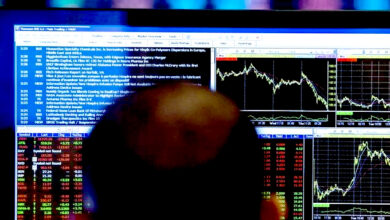European stocks go down before the eagerly awaited ECB meeting.

European stock markets fell before a big meeting of the European Central Bank. At that meeting, the bank should announce a plan for raising interest rates to fight rising inflation.
By 3:45 a.m. ET (07:45 GMT), the DAX in Germany was down 0.7%, the CAC 40 in France was down 0.5%, and the FTSE 100 in the UK was down 0.5%.
Focusing on the ECB’s policy-setting meeting later in the session, traders were careful on the European markets. Most people think that the central bank will soon say that it will stop buying large amounts of assets. This will make it possible for interest rates to go up next month for the first time in more than a decade, which is needed to fight record levels of inflation.
Last month, President Christine Lagarde announced a plan to end the central bank’s very easy monetary policy. She said that the ECB’s deposit rate of minus 0.5 percent should start going up in July and could be at zero or “slightly above” by the end of September, before going up even more “towards the neutral rate.”
Lagarde has already said that rate hikes will start in July, so her press conference is likely to be where most of the action will be. Investors will be looking for clues about how aggressively the bank could act when inflation is more than four times its medium-term goal of 2%.
In business news, British American Tobacco (LON:BATS) stock dropped 0.6%, but it still did better than the overall index. This was because the tobacco giant kept its full-year guidance, even though it decided to sell its Russian business after Russia invaded Ukraine.
After going up on Wednesday, Credit Suisse (SIX: CSGN) stock dropped by 3.6% as doubts about a takeover by U.S. financial giant State Street (NYSE: STT) grew.
There isn’t much important economic data coming out of Europe on Thursday, but China released trade data late Wednesday that was better than expected. This suggests that the world’s second largest economy may be on the upswing as it lifts its strict COVID-19 measures.
Oil prices have gone down from the three-month highs they hit earlier in the session. This is because Chinese trade data showed that the world’s largest crude importer, China, was buying more crude.
Official data from the U.S. Energy Information Administration, which was also released on Wednesday, showed that crude oil stocks went up by just over 2 million barrels last week, but gasoline stocks went down by 812,000 barrels, which shows that fuel demand is still strong even though prices are going up.
By 3:45 AM ET, U.S. crude futures were down 0.5% to $121.52 per barrel, while the Brent contract was down 0.4% to $123.07. Both benchmarks hit their highest closes since March 8 on Wednesday.
Also, gold futures went down 0.3% to $1,851.85/oz, and EUR/USD went down slightly to 1.0712.





